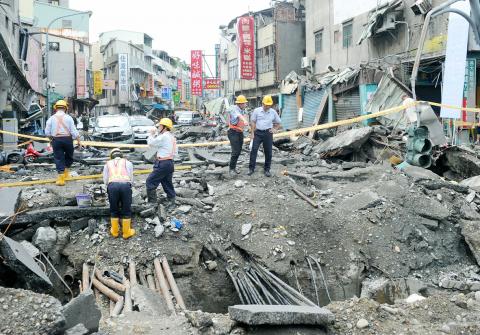Experts have called for the government to install a comprehensive pipeline monitoring system to avoid a repetition of the gas explosions that took place in Greater Kaohsiung on Thursday night and early Friday morning, causing at least 28 deaths and leaving 286 people injured.
Petrochemical companies have vast networks of underground pipelines in Kaohsiung, said Chen Chih-yung (陳志勇), professor of chemical engineering at National Cheng Kung University.
“To prevent such a tragedy from recurring, we must have transparency. People have the right to know the real information,” said Chen, who also serves on the board of CPC Corp, Taiwan (CPC, 台灣中油) as an independent director.

Photo: Wang Min-wei, Taipei Times
“The government should inform the public where the petrochemical pipelines are buried, then a monitoring system must be installed for the entire petrochemical pipeline network in the city. Also, the government must establish standard operating procedures for emergency responses,” he said.
Chen said the most important thing now is for the government to calm public fears.
“Of course, we must find out who is responsible for the gas explosions, but that is not the priority at this time,” he said. “The first thing to do is to tell the public where the pipelines are laid and where there are no pipelines. Like when an earthquake strikes, information on the epicenter is reported on the news, so people can be alert.”
However, Chen said he knows that if maps of underground pipelines were published, they might affect real-estate prices.
“However, people have the right to know. To understand a situation better can help in prevention. It’s not knowing what and where [the pipelines are] that is most frightening to people,” Chen said.
“CPC is the top boss of Taiwan’s petrochemical industry, so it should be the first to come out and make a comprehensive examination of all the old and aging pipelines,” he added, saying that all petrochemical companies have installed pressure gauges at both ends of pipelines, which help to detect leaks.
However, he said he was not sure whether there are pressure gauges throughout other sections of pipe and added that there are other engineering methods to check on leaks.
“For example, in culvert pipes, monitoring devices are installed at regular intervals. It costs more money to install such systems and there are other factors considered. So we are not sure whether Taiwan’s petrochemical companies have done so,” Chen said.

MAKING WAVES: China’s maritime militia could become a nontraditional threat in war, clogging up shipping lanes to prevent US or Japanese intervention, a report said About 1,900 Chinese ships flying flags of convenience and fishing vessels that participated in China’s military exercises around Taiwan last month and in January last year have been listed for monitoring, Coast Guard Administration (CGA) Deputy Director-General Hsieh Ching-chin (謝慶欽) said yesterday. Following amendments to the Commercial Port Act (商港法) and the Law of Ships (船舶法) last month, the CGA can designate possible berthing areas or deny ports of call for vessels suspected of loitering around areas where undersea cables can be accessed, Oceans Affairs Council Minister Kuan Bi-ling (管碧玲) said. The list of suspected ships, originally 300, had risen to about

DAREDEVIL: Honnold said it had always been a dream of his to climb Taipei 101, while a Netflix producer said the skyscraper was ‘a real icon of this country’ US climber Alex Honnold yesterday took on Taiwan’s tallest building, becoming the first person to scale Taipei 101 without a rope, harness or safety net. Hundreds of spectators gathered at the base of the 101-story skyscraper to watch Honnold, 40, embark on his daredevil feat, which was also broadcast live on Netflix. Dressed in a red T-shirt and yellow custom-made climbing shoes, Honnold swiftly moved up the southeast face of the glass and steel building. At one point, he stepped onto a platform midway up to wave down at fans and onlookers who were taking photos. People watching from inside

Japan’s strategic alliance with the US would collapse if Tokyo were to turn away from a conflict in Taiwan, Japanese Prime Minister Sanae Takaichi said yesterday, but distanced herself from previous comments that suggested a possible military response in such an event. Takaichi expressed her latest views on a nationally broadcast TV program late on Monday, where an opposition party leader criticized her for igniting tensions with China with the earlier remarks. Ties between Japan and China have sunk to the worst level in years after Takaichi said in November that a hypothetical Chinese attack on Taiwan could bring about a Japanese

The WHO ignored early COVID-19 warnings from Taiwan, US Deputy Secretary of Health and Human Services Jim O’Neill said on Friday, as part of justification for Washington withdrawing from the global health body. US Secretary of State Marco Rubio on Thursday said that the US was pulling out of the UN agency, as it failed to fulfill its responsibilities during the COVID-19 pandemic. The WHO “ignored early COVID warnings from Taiwan in 2019 by pretending Taiwan did not exist, O’Neill wrote on X on Friday, Taiwan time. “It ignored rigorous science and promoted lockdowns.” The US will “continue international coordination on infectious